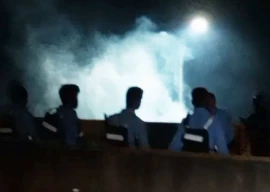
Identification is a basic human right and unfortunately, when casualties occur amidst high temperature flames like this one, or air crashes, or when there are explosions, the authorities always turn towards DNA identification.
DNA analysis is a complex procedure where samples need to be very accurate. When it comes to charred bodies, very few DNA samples can be extracted, which is why it takes a long time to identify the bodies. This causes the families of the deceased ones to suffer greatly. There is no reason to complain about the capability and capacity of DNA facilities across Pakistan, as we are new to this technology. But the shortage of proper experts in this domain is troubling.
So what is the solution? According to Interpol’s protocol, three internationally acclaimed scientific procedures used for identification are fingerprint matching, odontology (using teeth remains) and DNA. All these procedures are considered standalone procedures, i.e., if identification is proved by one of these procedures, there is no need to try the others.
Fingerprints are mostly used in identifying the living, but this method becomes unreliable if the body of the living person has been slightly burnt, or if it has been soaked for a long period of time.
Forensic odontology or forensic dentistry, as a science, is rarely used in our region and we are lucky to have one person in Punjab who is an expert in this field. With the help of this method, we can establish dental records of the population. A dental database can work alongside the NADRA database, making the identification process less costly and quick. Teeth, being the hardest structure in the body, can withstand temperatures of up to 800 degrees centigrade.
This form of identification is not only cheaper, but also more reliable. There is a dire need to upgrade the identification systems in the country as these will help with disaster management, and also help us meet our security imperatives. Yes, we have the capacity to develop such science to decrease the burden on DNA identification, as well as reducing the burden on the exchequer. This will, in turn, make our criminal justice system more efficient.
Published in The Express Tribune, February 9th, 2015.


1729080111-0/BeFunky-collage-(63)1729080111-0-165x106.webp)
1730838202-0/Trump-(1)1730838202-0-165x106.webp)













COMMENTS (1)
Comments are moderated and generally will be posted if they are on-topic and not abusive.
For more information, please see our Comments FAQ